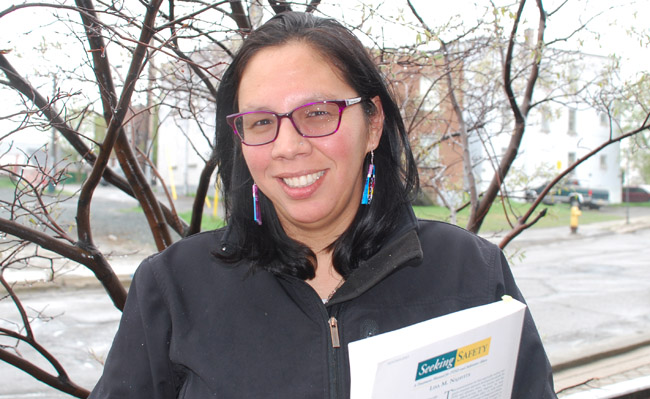Seeking Safety program moves forward from trauma, addiction

By Laura E. Young
SUDBURY –For Lisa Osawamick, success in the Seeking Safety program can be as profound and meaningful as having a family reunited.
The drug and alcohol worker and co-facilitator of Seeking Safety recalls a case where a family was reunited after a member followed the 10-week program. The Seeking Safety Drop-in Group is all about learning how to cope with trauma and addiction and adding the necessary tools to the basket one carries on the healing journey, says Osawamick.
Seeking Safety is offered through a partnership between Sudbury’s N’Swakamok Native Friendship Centre and Shkagamik-Kwe Health Centres, where co-facilitator Brian Nootchtai Jr. is a cultural counsellor.
This is the second time the centres have offered the program which began on April 27. On June 30 Seeking Safety will close with a celebration for the 14 men and women involved.
“When participants are completing the 10 weeks, I would like them to go away saying, ‘I can manage and I can cope with what I’m going through,’” Osawamick says.
She also wants participants to become comfortable using “our holistic ways” and practices of healing, and be connected with all of Creation, she says.
Osawamick especially appreciates Seeking Safety’s connection to holistic indigenous practices. In the first program, three Sweats were included. The eight women who went through it later said the Sweats “really helped them heal from trauma and addition and ground themselves, letting go of that old stuff,” Osawamick recalls.
Seeking Safety is an intense program, covering a range of topics in 90-minute sessions, once a week for 10 weeks. Participants are asked for a minimum six-week commitment. Participants sit in a circle and begin with a smudge. There is a group check-in and a teaching related to the topic at hand, or one of the Seven Grandfathers’ Teachings. Elders are invited to visit and provide a teaching.
“It’s not what Brian and I bring to the session, it’s what everybody brings. It’s the power of the Circle, the power of the sacredness within the Circle and the interconnectedness of everyone’s stories to help them move from ‘that’ (dark) place and also relates to the other person,” Osawamick says.
Topics include reflections and lessons on compassion, post traumatic stress and taking care of oneself to healing from anger. The spiritual aspects of the teachings are included; there is humour, Osawamick adds. “No matter what, there’s s always something to laugh at.”
Seeking Safety grew from the work of Teresa Marsh, who has studied in Rural and Northern Health, and applied Native holistic practices to the Seeking Safety model. Seeking Safety originated in a treatment manual for PTSD and substance abuse by Lisa Najavits, an associate professor of psychiatry at Harvard Medical School.
Marsh, who trained Osawamick and Nootchtai Jr., also shares her expertise as a guest speaker at one of the healing sessions.
In the current sessions, participants range in age and background; the majority are registered First Nations in the urban Sudbury area. They have experienced a host of traumas and are possibly struggling with substance abuse, says Osawamick.
For more information, contact Osawamick at 705-674-2128 or Nootchtai Jr. at 705-375-1596, etc. 218. Osawamick, who is currently halfway through her masters of social work, is the founder of The Travelling Bundle, an outreach program of mobile Wholistic Anishinaabe Teachings.


